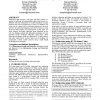Free Online Productivity Tools
i2Speak
i2Symbol
i2OCR
iTex2Img
iWeb2Print
iWeb2Shot
i2Type
iPdf2Split
iPdf2Merge
i2Bopomofo
i2Arabic
i2Style
i2Image
i2PDF
iLatex2Rtf
Sci2ools
AIRWEB
2007
Springer
2007
Springer
A Taxonomy of JavaScript Redirection Spam
Redirection spam presents a web page with false content to a crawler for indexing, but automatically redirects the browser to a different web page. Redirection is usually immediate (on page load) but may also be triggered by a timer or a harmless user event such as a mouse move. JavaScript redirection is the most notorious of redirection techniques and is hard to detect as many of the prevalent crawlers are script-agnostic. In this paper, we study common JavaScript redirection spam techniques on the web. Our findings indicate that obfuscation techniques are very prevalent among JavaScript redirection spam pages. These obfuscation techniques limit the effectiveness of static analysis and static feature based systems. Based on our findings, we recommend a robust counter measure using a light weight JavaScript parser and engine. Categories and Subject Descriptors D.3.3 [Information Storage and Retrieval]: Information Search and Retrieval; H.3.m [Information Storage and Retrieval]: Miscel...
AIRWEB 2007 | Internet Technology | JavaScript Redirection | JavaScript Redirection Spam | Redirection Spam |
| Added | 07 Jun 2010 |
| Updated | 07 Jun 2010 |
| Type | Conference |
| Year | 2007 |
| Where | AIRWEB |
| Authors | Kumar Chellapilla, Alexey Maykov |
Comments (0)

